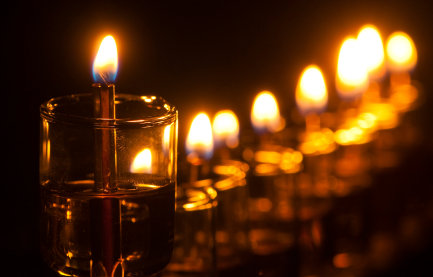
Hanukkah Lights via npr.org
To say that few know of the meaning behind the feast of Hanukkah…would be an understatement. To say that it has a lot to do with perfumes…would seem a folly. Yet so it is…
As the year draws to an end, we are reminisced of the Maccabees’ victory against the Greek invader and to many, Hanukkah is naught but a celebration of God-willed warfare, a yearly and joyous reminder that centuries ago, His hand spilt blood onto the Holy Land, justifying the Templars’ war cry of “Deus lo vult” meaning “God wants it”. For indeed, many see the miracle of Hanukkah, -the cruse of oil burning for eight days straight despite there being enough oil to burn for just one- as a dazzling show of God’s blessing after his people had thrown out the Greeks.
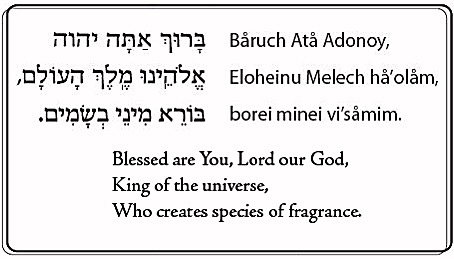
Hebrew Blessing over Perfume
Why then should we rejoice over victory in battles and speak of such miracles when in fact all we care about is perfume? Precisely because there is more to Hanukkah than the miraculous reclaiming of the Promised Land and because the miracle of the oil, like all miracles, is a way to open our hearts and eyes to a higher truth. Hence today we shall not dwell on the politics nor much on perfumes but rather we shall dive into the very mystical meaning of Hanukkah. Into that of Perfume itself…
I must say I was blest to learn from great theologians, be they Jewish, Christian or Muslim and the first thing we are taught in exegetic studies, is that there are many layers or senses to the Scripture. Among them are the Peshat, the Historical sense –that is the first- and the Sod or Anagogical –that is the last. I shall only dwell on the latter but before going any further, I must clarify what the miracle actually was.
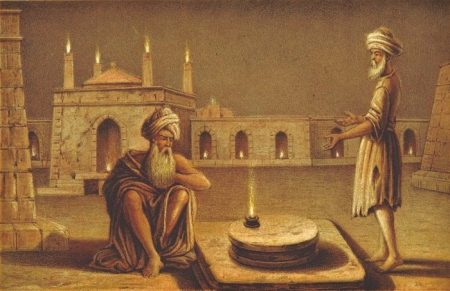
The miracle of Hanukkah oil via thegemara.com
It so happened that after having reclaimed the Temple, the Maccabees found it utterly defiled and as they wanted to rekindle the seven lights of the Hanukkah Menorah, they realised they had enough pure oil to last them for a day. We must state that the Torah allows, in such dire circumstances, that impure oils may be used for the offerings or that the word of the Law may altogether be overseen. Yet the Maccabees chose to use the little oil that they had and so they kindled the Menorah and lo, the oil lasted through seven more days. Upon hearing this, one can but think of the Book of Kings where it is that during a terrible draught, the prophet Elijah met a widow and asked her for a loaf of bread. The widow answered that she had enough flour and oil to feed her son and self yet Elijah insisted, prophesying that her jug of oil would not run dry.
” And she went and did according to the saying of Elijah: and she, and he, and her house, did eat many days. And the barrel of meal wasted not, neither did the cruse of oil fail, according to the word of the Lord “
This first miracle announces the future one and certainly did the Maccabees remember it when they decided to use up the little rest of their oil as an offering to God. Oil is at the centre of these two episodes and we can already learn something of Hanukkah upon studying the first one for indeed we see that the oil’s first purpose is to nourish and feed the body thus, the widow’s offering means that not only did she know there was more to life than its material and physical aspect but she willingly chose what she could not see –the spiritual and God’s blessings- over what she could see –the world and the mundane- valuing God’s will more than her own life. It also shows a very important theme in Biblical exegesis: that the material is but a mirage of the spiritual or, as it is said in the Book of Hebrews about the sanctuary in which stood the Menorah: “Who serve unto the example and shadow of heavenly things» and so the physical oil that nurtures the body is but a shadow of the spiritual oil, that is the Knowledge of God, which nurtures the soul.”
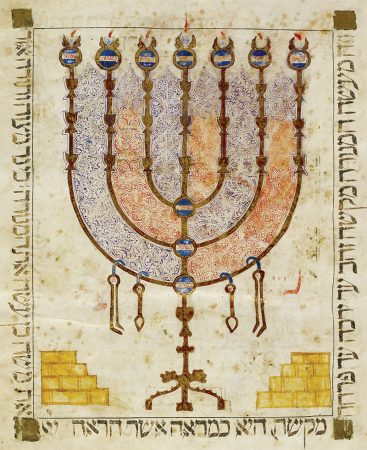
Menorah miniature via historytoday.com
As such, the Menorah, as the rest of the Temple, is a mirror of what stands in Heaven and so the miracle of the oil and the kindling of lamps during the eight days of Hanukkah are not about celebrating a victory or a miracle more than they are about contemplating the light of God Himself. For indeed, God’s shechina, His Divine Presence was in form of pure light so that the lights burnt during Hanukkah are the symbol of God descending amongst us and the Menorah itself mirrors the seven-branched Tree of Life which is the breath of God through His Creation. It is precisely that Menorah which will lead us to understanding how Hanukkah and perfume are somehow linked.
The first Menorah appeared in the Book of Exodus, where God ordered Moses that he built a seven-branched candelabra hammered out of a single piece of gold. Moses is said to have been startled and asked for a vision and so he made it. The description of the Menorah is very detailed but we will only linger on this “single piece of gold”.
Now we settled that all things physical are “a shadow of heavenly things” and that as such, the oil represents the knowledge of God, the light His Divine Presence and the Menorah mirrors the Tree of Life, itself being the way through which God breathes Life into His Creation. Because of this, the unity of the Menorah, “hammered out” of a single piece of gold, tells us of God’s own unity compared to our disunion which means that in order to know God, one must first become one and that can only happen with God’s help.
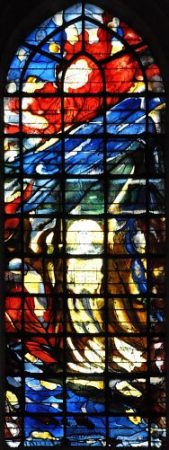
Moses and Aaron stained glass window via patrimoine-histoire.fr
Moses, indeed, did not build the Menorah himself but had Bezalel do it, whose name means “protection of God” teaching us that one can only start this journey to understanding God by letting oneself be guided by Him, by surrendering yourself to Him the same way the widow surrendered her oil and flour to Elijah. And as you look upon the Menorah or the Tree of Life, you will see that no matter the path or branch you take, it will always be made of the same gold, start from the same place and end at the same height –that is God. No matter which candle you burn, it is still part of the same One Light that is the Light of God and because the Menorah is but a “shadow of heavenly things” it serves as a way to teach us that God’s unity is preternatural. In other words, in order to become One with God as once we were, we must first become one with our own self.
For us to reach the spiritual we must work on the physical as the physical is a way to reach the spiritual. In order to reunite with God, we must reunite our body and soul and that is where perfume comes in for that is what perfume is for.
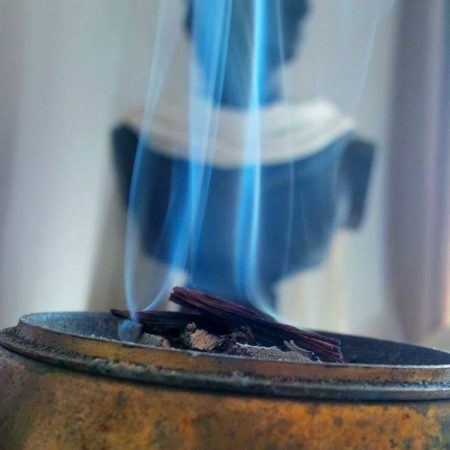
Incense wisps by Alexandre Helwani
Per-fume, “through, by way of smoke”. Which way does perfume lead if not to God? For that was its very first purpose as the psalm 124 says: “Let my prayer arise before Thee like incense, the lifting up of my hands be an evening sacrifice”. The smoke of incense, the physical symbol of our prayers as they rise; its perfume the symbol of God’s presence and bounty.
Perfume acts as a link between two worlds, its subtlety a constant reminder that there is more to life than what we see, for perfume indeed is invisible, impalpable; it makes no sound of horn, shines not, burns not like the Sun – yet it is. It is an everyday door to the subtlest realities of our world; an ailment to our body and our soul for it touches both; dredges from oblivion memories past and loves lost. For it heals the body, also does it our soul. The very aim of Liturgy is this: through the senses, to seize the body so as to reach the soul. For we are both, body and soul and only through the union of the two shall we taste God’s unity that is Peace and Light.
For that is what Hanukkah ever was about. A miracle of Peace. A miracle of Light.
“Ye are the Light of the world (…) Let your light so shine before men” – Mt. 5.14-15
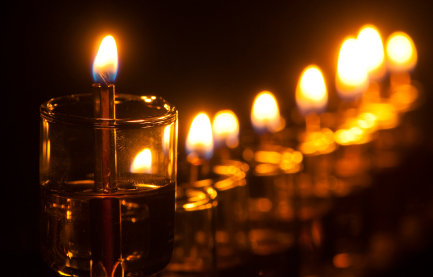
Menorah via greenlandgenealogy.wordpress.com
Chag urim sameach,
Chag Hanukkah.
Happy Festival of Lights,
Happy Hanukkah.
Alexandre Helwani – Contributor
Editor’s Note: Hanukkah begins (began) December 22, 2019 at sundown.
Since our inception in 2010, we have had a tradition of celebrating Hanukkah and fragrances I wrote our first Hanukkah Fragrances post on December 1, 2010, then in 2011, Tama Blough (RIP) in 2012, next was Nancy Lichtenstein in 2013, followed by Drew Chafee in 2014, Aaron Potterman 2015, Robert Herrmann (RIP in 2016 as well as 2017) and Sr. Editor Ida Meister in 2018. We have come from all religious backgrounds- Michelyn Camen, Editor-in-Chief
Follow us on Instagram @cafleurebon @theperfumechronicles
